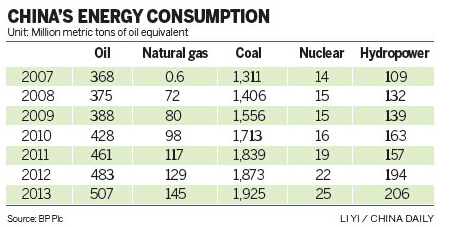Nation's energy demand slowing
Energy demand growth in China fell below the 10-year average amid an economic transformation, British oil giant BP Plc said on Tuesday.
Continued economic transformation drives change, according to BP report
The company said in its annual global energy report, released in Beijing on Tuesday, that China, the world's largest energy consumer, accounted for 22.4 percent of the global energy consumption and for 49 percent of the net growth in the world in 2013.
"Normally, energy consumption growth traditionally reflects the rate of economic growth," Ruhl said. "Energy consumption in the United States benefited from the shale gas boom. There are lots of cheap fuels that feed into the industry which will eventually reflect in GDP growth, but in China's case, it's not that easy to reconcile to the slowdown in energy numbers."
He added that the moderate growth was mainly driven by lower consumption of coal, which can be partly attributed to the domestic economic restructuring. The share of China's service sector surpassed that of the industrial sector for the first time in 2013, he said, leading to a further decline in the use of energy.
"China's slowdown in coal usage cannot be attributed to the government's environmental policies, as the closure of coal plants and the push for clean energy started rather late in the year, and hence cannot be attributed in the full-year numbers," Ruhl said.
Last year, coal continued to be a dominant source of energy and accounted for 67 percent of the overall energy pie.
Total coal production in China slowed even further, with growth of just 1.2 percent - the weakest since 2000.
The demand for oil, the second-largest fuel in China, also hit its lowest point since 1991, accounting for 17.8 percent of the country's energy consumption, BP said.
Over the past decade, natural gas has doubled its share of total energy consumption to 5.1 percent, and the share of non-fossil fuels increased by more than 50 percent to 9.6 percent.
Wang Tao, a resident scholar with the Energy and Climate Program of the Carnegie-Tsinghua Center for Global Policy in Beijing, said that the fact that the growth of all the three major fossil fuels, including natural gas, fell below average in the past decades, is a reflection of a major trend that is evolving in the energy market.
"Apparently, this important shift in China is structural, and whatever is the reason, it is certainly happening," he said.
The company said in its annual global energy report, released in Beijing on Tuesday, that China, the world's largest energy consumer, accounted for 22.4 percent of the global energy consumption and for 49 percent of the net growth in the world in 2013.

"Normally, energy consumption growth traditionally reflects the rate of economic growth," Ruhl said. "Energy consumption in the United States benefited from the shale gas boom. There are lots of cheap fuels that feed into the industry which will eventually reflect in GDP growth, but in China's case, it's not that easy to reconcile to the slowdown in energy numbers."
He added that the moderate growth was mainly driven by lower consumption of coal, which can be partly attributed to the domestic economic restructuring. The share of China's service sector surpassed that of the industrial sector for the first time in 2013, he said, leading to a further decline in the use of energy.
"China's slowdown in coal usage cannot be attributed to the government's environmental policies, as the closure of coal plants and the push for clean energy started rather late in the year, and hence cannot be attributed in the full-year numbers," Ruhl said.
Last year, coal continued to be a dominant source of energy and accounted for 67 percent of the overall energy pie.
Total coal production in China slowed even further, with growth of just 1.2 percent - the weakest since 2000.
The demand for oil, the second-largest fuel in China, also hit its lowest point since 1991, accounting for 17.8 percent of the country's energy consumption, BP said.
Over the past decade, natural gas has doubled its share of total energy consumption to 5.1 percent, and the share of non-fossil fuels increased by more than 50 percent to 9.6 percent.
Wang Tao, a resident scholar with the Energy and Climate Program of the Carnegie-Tsinghua Center for Global Policy in Beijing, said that the fact that the growth of all the three major fossil fuels, including natural gas, fell below average in the past decades, is a reflection of a major trend that is evolving in the energy market.
"Apparently, this important shift in China is structural, and whatever is the reason, it is certainly happening," he said.








